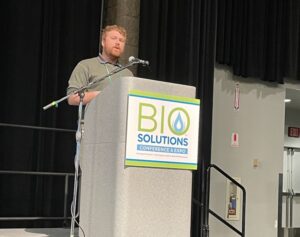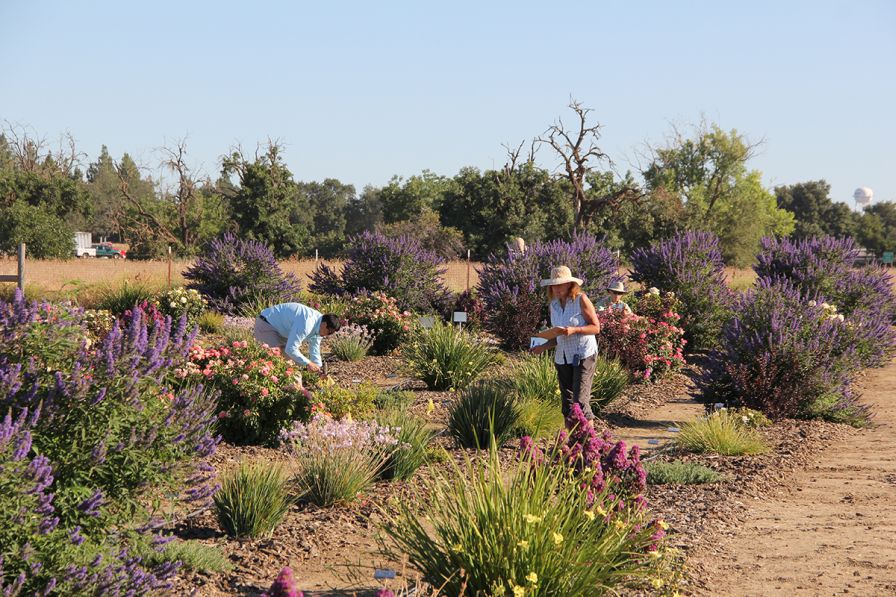Day 2 of BioSolutions Conference Brings New Info on Emerging Technology, and More

Cody Seals, Beneficial Insectary
After an informative Day 1 of the BioSolutions Conference & Expo in Visalia, CA, Day 2 kicked off with a presentation from BioWorks. Michael Brownbridge and Julie Graesch gave an overview of the compatibility of biopesticides with traditional chemistry and other biologicals.
Brownbridge said that biopesticides are ideal in an integrated pest management (IPM) program because they have proven efficacy, safety, and compatibility. Biopesticides have different modes of action than conventional pesticides. He emphasized that biopesticides are not curative or stand-alone products.
“History has proven that if we use one class of chemistry and repeatedly apply it, we increase the possibility of resistance developing in that pest or disease,” Brownbridge said.
Graesch highlighted a few key points for growers. She said biopesticides can be used with synthetic chemistry, but the programs are individualized, and there is no one-size-fits-all solution. Growers should check the label and the company website, noting that biologicals may not always be compatible with each other.
“When doing a biological program, that doesn’t mean that you can’t use synthetic chemistries,” Graesch said. “It just means you should consider intelligent timing and use to prevent pest resistance from occurring, and preserving natural enemies and pollinators.”
Three speakers had an opportunity to spotlight emerging technologies. Dr. Mary Wildermuth, Associate Professor of Plant and Microbial Biology at University of California, Berkeley, discussed spray-induced silencing of powdery mildew genes to reduce powdery mildew disease of agricultural crops. Jin-Woo Kim, Director of Bio/Nano Technology Group and Professor of Biological Engineering at the University of Arkansas, presented on nanoscale cellulosic materials and their applications in agriculture.
Cody Seals, U.S. Product Manager for Beneficial Insectary, spoke on release and delivery technologies for beneficial insects. High-tech methods include digital monitoring and automated monitoring. Digital monitoring is done in real-time and allows for data analysis, precision targeting, and historical data tracking. With automated monitoring, there is a cost savings, and the system allows for early detection and remote monitoring. Technology, which is always evolving, will reduce labor and increase accuracy when distributing beneficial insects.
“When you’re doing integrated pest management (IPM), you have to wear a lot of hats,” Seals said. “You have to approach it from a lot of different angles.”
Jeremy Wagnitz, Product Development Manager for Certis Biologicals, discussed the science behind biologicals. With so much reliable data, manufacturers can prove that biologicals do work.
“These products are becoming more reputable,” Wagnitz said. “It’s not just a bug in a jug idea.”
The conference closed with a keynote panel on the California Road Map to Sustainable Pest Management (SPM), moderated by Carol Miller, Conference Chair and Editor of American Vegetable Grower. The panel included Julie Henderson, Director of the California Department of Pesticide Regulation; Jim Farrar, Director of University of California (UC) IPM; Christine Birdsong, Undersecretary for the California Department of Food and Agriculture; and Don Cameron, Vice President and General Manager of Terranova Ranch in Helm, CA.
Henderson explained that by 2050, the state of California aims to eliminate the use of priority pesticides by transitioning to more sustainable practices. This will support a stable, healthy food supply, address new and increasing pest pressures, and build on the IPM programs already in use.
“This is the continuation of a trend in California going back at least three decades,” Farrar said.
Some attendees stuck around for additional workshops after the conference concluded. Suzanne Wainwright-Evans, Owner of Buglady Consulting, and Kim Horton, Agronomy Manager for Taylor Farms, hosted a workshop on the power of beneficial insects. Hanna Kahl, Ecological Pest Management Specialist for the Community Alliance with Family Farmers, moderated a workshop on the path toward Sustainable Pest Management in California.
Find more coverage from the BioSolutions Conference & Expo on LinkedIn at BioSolutions Conference & Expo.









